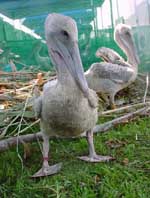Scores of baby pelicans are starving along California coast
Miles (kilometers) from the shoreline, 10 baby brown pelicans lounge by a pool in a roomy cage, large buckets of fish there for the taking.

Just days ago, these birds could not feed themselves at all.
Scores of starving baby pelicans emaciated, cold and too weak to fly are washing up on California beaches in disturbing numbers this spring.
The underfed California brown pelicans have stirred concerns over the endangered species, which in recent years has shown strong signs of recovery. Biologists say the recovery could actually be the source of the problem: There are more pelicans competing for food.
The International Bird Rescue Research Center in Cordelia has taken in almost two dozen pelicans this month, most of them near Santa Cruz and Monterey, all of them 2 to 4 months old.
The center's sister facility in San Pedro, south of Los Angeles, has cared for more than 50 Southern California birds since late May.
The California brown pelican nearly disappeared in California in the early 1970s, a decline blamed largely on the pesticide DDT, which caused pelicans to lay eggs with shells so fragile that parents would break them when they tried to sit on them.
The population began to rebound after the federal government banned DDT in 1972, and scientists estimate 7,000 breeding pairs have nested in California in recent years. The U.S. Fish and Wildlife Service is now considering whether to remove the California brown pelican from the endangered species list.
Several dead birds tested recently by the California Department of Fish and Game turned up with empty stomachs, said Hannah Nevins, a seabird biologist with the agency. No evidence of toxins or infectious diseases was found.
Nevins said a successful breeding season this spring made the competition for food among the pelicans more intense. Young pelicans fresh from the nest must compete with adult birds.
"You see all these young birds trying to make it on their own," she said.
More research is needed to see whether the starving birds also indicate a shortage of the sardines, anchovies and other small fish on which pelicans feed, Nevins said, reports AP.
O.Ch.
Subscribe to Pravda.Ru Telegram channel, Facebook, RSS!




